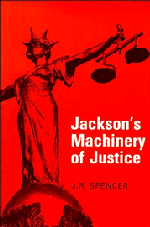Book contents
- Frontmatter
- Contents
- Acknowledgements
- List of figures
- List of tables
- Preface
- Preface to the first edition of ‘The Machinery of Justice in England’
- Abbreviations
- I Historical introduction
- II Civil jurisdiction
- III Tribunals
- IV Criminal jurisdiction
- V The personnel of the law
- 27 Solicitors
- 28 Barristers
- 29 Legal education
- 30 Should the profession continue to be divided into barristers and solicitors?
- 31 Judges
- 32 Juries
- 33 Lay justices and stipendiary magistrates
- 34 The administration of the courts
- VI The European dimension
- VII The cost of the law
- VIII Law Reform
- Appendix A The Report of the Civil Justice Review
- Table of Cases cited
- Table of Statutes cited
- Table of Stationery Office publications cited
- Index
27 - Solicitors
Published online by Cambridge University Press: 10 January 2011
- Frontmatter
- Contents
- Acknowledgements
- List of figures
- List of tables
- Preface
- Preface to the first edition of ‘The Machinery of Justice in England’
- Abbreviations
- I Historical introduction
- II Civil jurisdiction
- III Tribunals
- IV Criminal jurisdiction
- V The personnel of the law
- 27 Solicitors
- 28 Barristers
- 29 Legal education
- 30 Should the profession continue to be divided into barristers and solicitors?
- 31 Judges
- 32 Juries
- 33 Lay justices and stipendiary magistrates
- 34 The administration of the courts
- VI The European dimension
- VII The cost of the law
- VIII Law Reform
- Appendix A The Report of the Civil Justice Review
- Table of Cases cited
- Table of Statutes cited
- Table of Stationery Office publications cited
- Index
Summary
The most striking thing about the legal profession in England is the division into solicitors and barristers. As the solicitors far outnumber the barristers, and the layman has more contact with solicitors than with barristers, what is technically the junior part of the profession may be described first. The profession of solicitor took its present form relatively recently. In earlier times the barristers practically constituted the whole profession, the men who eventually evolved into solicitors being then far more lowly members of society. The old courts of King's Bench and Common Pleas had attached to them a number of attorneys who were appointed and controlled by the judges. These attorneys represented their clients and so could take many of the formal steps required for litigation. Some measure of legal ability or knowledge of procedure was required before a judge would admit a man as an attorney, but on the whole the attorneys were not sufficiently learned for the more important work of framing and then presenting a case; the more skilled work fell to the barristers. The rise of the Court of Chancery led to the need for a class of men corresponding to the common law attorneys; the counterpart of the attorneys were the solicitors of the Chancery Court, whose chief work was perhaps to ‘solicit’ (worry or bribe) the officials so that the customary delays of Chancery proceedings were reduced as far as possible. The ecclesiastical and admiralty courts had a similar class of men called proctors.
- Type
- Chapter
- Information
- Jackson's Machinery of Justice , pp. 327 - 335Publisher: Cambridge University PressPrint publication year: 1989

